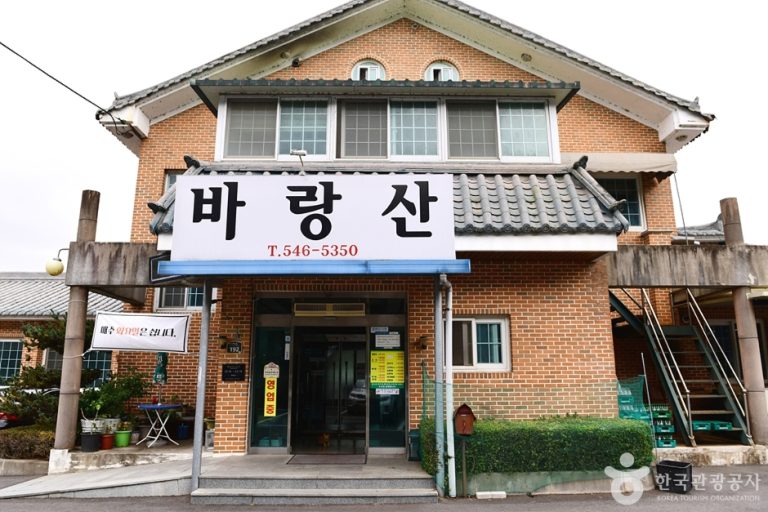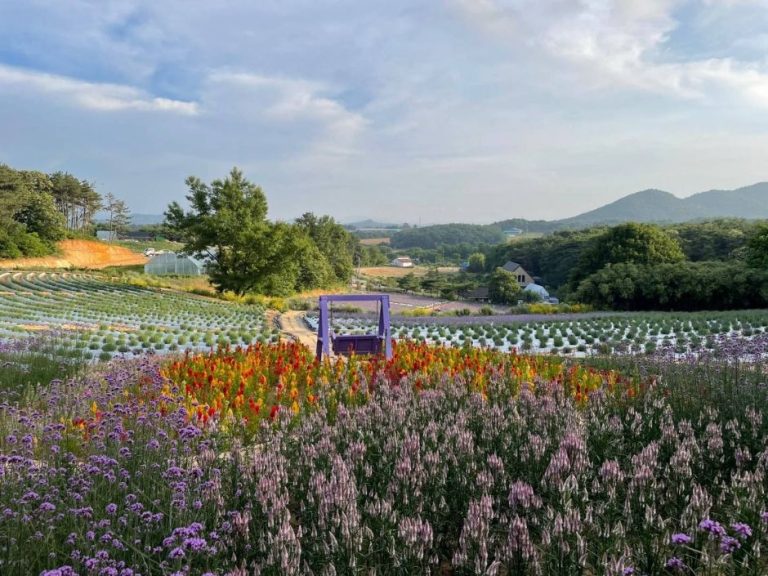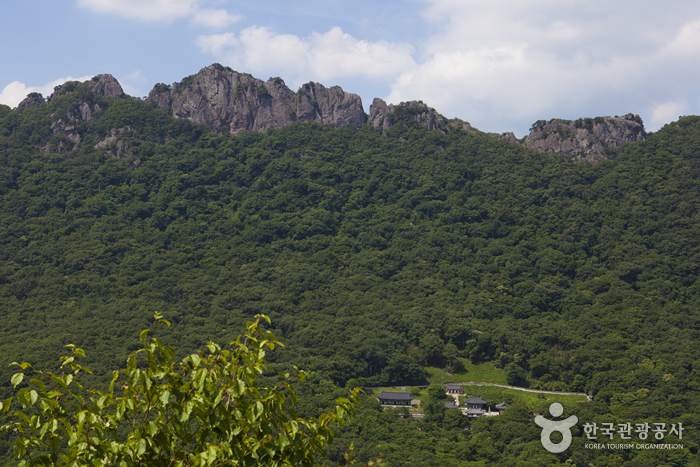Jeonjuhyanggyo Local Confucian School (전주향교)
Jeonjuhyanggyo Local Confucian School (전주향교)
– Homepage
www.jjhyanggyo.or.kr
Jeonjuhyanggyo is a local Confucian school that was established during the Joseon dynasty (1392-1910) and is a designated Historic Treasure. This was a national education center during the Joseon period. The school was originally located at the Gyeonggijeon Shrine site, but was relocated in 1603. The mortuary tablets of seven Chinese Confucian scholars and 18 Korean scholars are enshrined in the main building of Daeseongjeon Hall. The site is popular for its 400-year-old ginkgo tree in the front yard, and is the most beautiful in fall.
– Address : 139 Hyanggyo-gil, Wansan-gu, Jeonju-si, Jeonbuk-do
※ Presentation Information
– Experience Guide
Sunday school, etiquette school, lectures, training, etc.
– Information and Guides
+82-63-288-4548
– Parking
Available
– Day Off
Mondays (Closed the following business day if Monday is a public holiday)
– Operating Hours
[Winter] 10:00-17:00 / [Summer] 09:00-18:00
– Restrooms
Available
– Admission Fees
Free
◎ Nearby Tourism Infobox
⊙ 2521 (이오이일)

– Homepage
cafe.naver.com/onesyouth2521
2521, pronounced yi-o-yi-il in Korean, a private guesthouse located in Jeonju Hanok Village. It was made popular as Na Hee-do’s house in the drama “Twenty-Five, Twenty-One (2022).” Upon booking, the owner will set the scene just like from the drama. Guests can enjoy a barbeque party at the yard and the view of the hanok village from the rooftop. The guesthouse can accommodate up to eight guests.
⊙ Jaman Mural Village (자만벽화마을)
– Homepage
www.jeonjuhanoktown.com
(Korean only)
Jaman Mural Village is located in the ridge between Omokdae and Imokdae along the foot of Seungamsan Mountain’s Jungbawi Rock. Jeonju Hanok Village is also visible from the wide street. Although it is a fairly steep walk up to Jaman Village, visitors will be able to enjoy colorful murals painted on the buildings and walls along the way.
⊙ Bu Yong Heon / 부용헌

– Homepage
http://www.buyongheon.com
– Tel
+82-10-8875-8587
Buyongheon is a Hanok stay in Jeonju Hanok Village, Jeollabuk-do, right next to the Jeonju Hyanggyo Confucian School. Accomodation is comprised of Toenmaru Bang, Daecheong Maru Bang, Large Daecheong Maru Bang and Big Sarangchae. The room is neat and feels the beauty of blank space. A culture experience program includes traditional etiquette and hanji making, while the Jeonju Hanbyeok Cultural Center and the Confucian school are reachable on foot. Jeonju Station and Jeonju Express Bus Terminal are 10 to 15 minutes away by car.
⊙ Saranggadeuk (사랑가득)

– Homepage
http://saranggadeuk.kr
– Tel
+82-10-7451-3355
Located in Jeonju Hanok Village, Saranggadeuk is a traditional hanok that was renovated from a traditional hanok built in 1900, which retains the elegance of hanok architecture in its toenmaru (narrow wooden porch), rafters, and eaves. The hotel has six guest rooms, including a spacious ondol (underfloor heated) room with an interior finished in cypress wood that emits a subtle scent. Each of the rooms has a bathroom with a shower, and the Cherry and Rose rooms are recommended for couples, while the Azalea rooms are recommended for groups. Breakfast is served with freshly baked toast, seasonal fruits, and coffee in the room, and cooking is not permitted.
⊙ Today [Korea Quality]오늘[한국관광 품질인증]

– Tel
+82-507-1348-1522
Today is a private hanok stay near the old Hyanggyo Confucian school in Jeonju, Jeollabuk-do. Accommodation consists of two bedrooms, living room, two bathrooms and a kitchen. There’s an indoor jacuzzi which guests will find soothes away weariness – especially with added Dead Sea salt (provided). The living room has a beam projector for movies; alternatively guests can play traditional games such as yutnori, gonggi, and gogu. In the backyard, there is a swimming pool, and also a fire pit where guests can make a barbecue and chat while staring at the fire.
⊙ Yangsajae (문화공간 양사재)

– Homepage
http://yangsajae.kr
– Tel
+82-63-282-4959
In Joseon times Yangsajae hanok stay in Jeonju Hanok Village, Jeollabuk-do, was part of the Jeonju hyanggyo or local Confucian school – a place of study and scholarship. Later the poet Lee Byeong-ki lived and wrote here, and later still, in 1987, the house became a public elementary school. Since 2002 it has been a hanok stay dedicated to cultural tourism and promotion of local history and traditions.
⊙ Omokdae and Imokdae Historic Sites (오목대와 이목대)
– Homepage
tour.jeonju.go.kr
– Tel
+82-63-281-2114
Omokdae Historic Site is located on top of a steep hill and is one of the places where Yi Seong-gye, who later became King Taejo, the first king of the Joseon dynasty, stopped to celebrate his victory on his way home from a war against the Japanese army at Unbong Peak of Hwangsan Mountain. Across the bridge from Omokdae is Imokdae Historic Site, situated at the foot of Seungamsan Mountain. Approximately 80 meters downhill from Imokdae are memorial stones and a building where Mokjo, the great-great-grandfather of King Taejo, once used to live. The engraved letters on the stones are the handwritings of Emperor Gojong. Mokjo moved to Hamgyeongdo as a result of a dispute with the then minister of Jeonju, an incident which King Taejo believed to have laid the foundation for him to shape the Joseon dynasty.
⊙ Siwon / 시원

– Homepage
https://blog.naver.com/siwon7840
– Tel
+82-10-6520-7840
Siwon is a timber and clay-built hanok stay, part of Jeonju Hanok Village in Jeollabuk-do. It has four guestrooms, all but one with a small attic – so guests can have fun climbing up and down the ladder! The rooms have all been insulated and draft-proofed to keep visitors warm and comfortable. In the yard is a small garden and swing, and guests can play traditional games such as Tuho and Jegichagi – or even take part in a carpentry workshop. Must-see sites such as Gyeonggijeon, Jeondong Cathedral, Omokdae, and Nambu Market can all be reached on foot.
⊙ Hanokstory (한옥이야기)

– Homepage
http://www.한옥이야기.kr
– Tel
+82-10-9203-1111, +82-10-4166-7799
Hanok Story, on Hyanggyo-gil in Jeonju Hanok Village, Jeollabuk-do, is a hanok guesthouse that harmonizes tradition with convenience. Each room is equipped with a toilet, TV and AC, and one room has cooking facilities. In the yard is a 50-year-old persimmon tree – the house’s tutelary spirit – and a cafeteria built of cypress wood. Here visitors can enjoy tea or a free breakfast, while at weekends tea ceremonies are held (but book ahead for this).

![The Face Shop [Tax Refund Shop] (더페이스샵)](https://ktrip.blogsailing.com/wp-content/uploads/2025/11/2890977_image2_1.jpg)


3 Comments